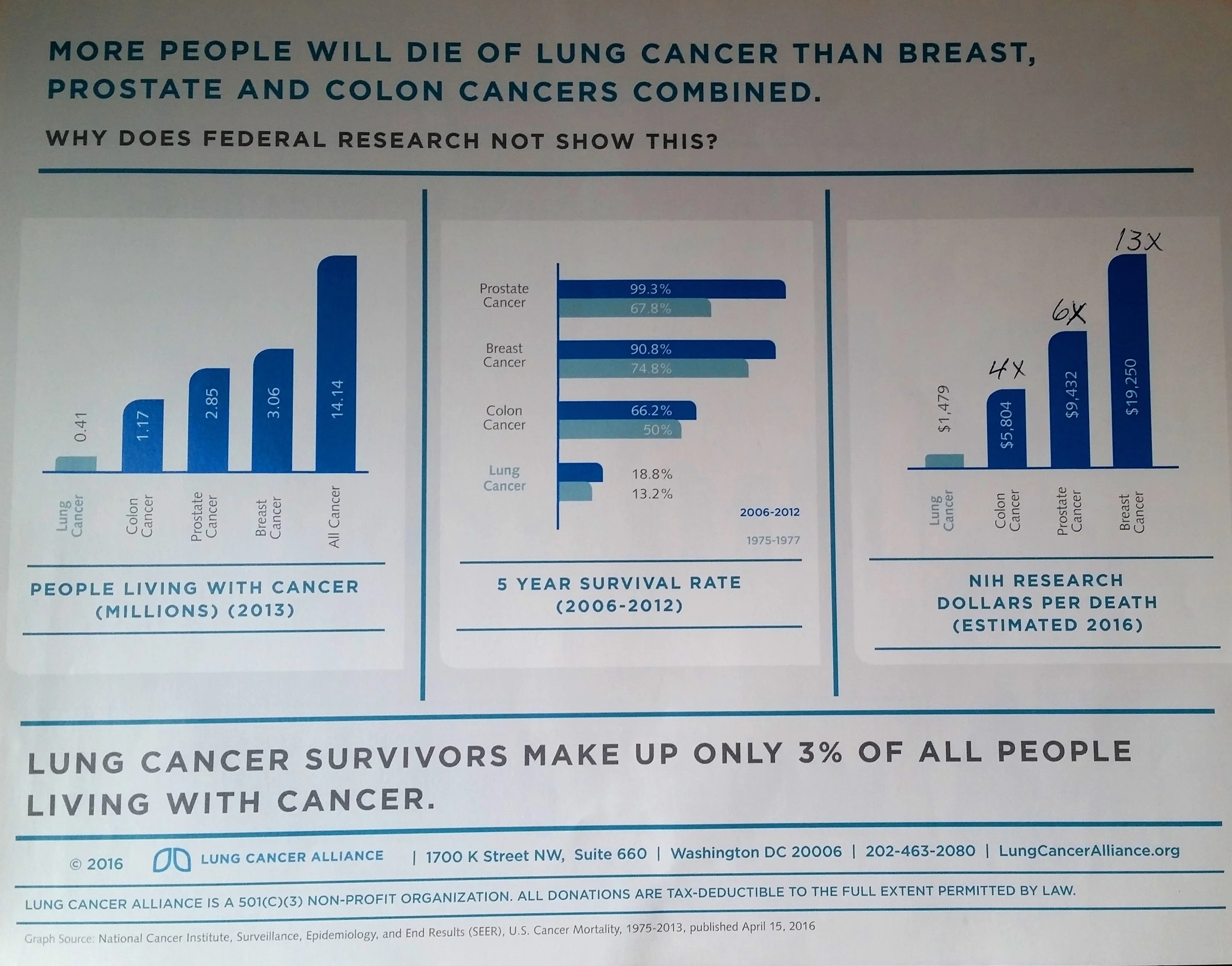Friends and Family,
If you would have told me a year ago that I would be lobbying senators and representatives in Washington, DC, I would have thought you were nuts. Since that’s exactly what happened last week, maybe I’m the one who’s nuts. How did I get myself into this???
Part of this answer is that I have been given an exceptionally rare gift for someone with Stage IV lung cancer: I am still alive after almost ten years. It is important to me to make good use of this gift.
Here’s the other part: The Lung Cancer Alliance puts on an annual Lung Cancer Summit. Even though I thought the description of the summit was vague, and I had just gotten back from the LUNGevity HOPE Summit in DC twelve days earlier, I signed up and held my breath. Imagine my surprise when I found out that the entire summit was organized around prepping100 survivors, caregivers, and other advocates to lobby our government!
After a day of training, we stormed the Hill. Oregon and Washington people went as a team, and met with the offices of four senators and five representatives. This is not an easy logistical feat: You meet when they tell you that you can meet. That meant that we walked over 11,000 steps (5+ miles) crisscrossing from the House to the Senate side of the Capital Mall, while getting maximum use of our umbrellas.
Although most of the time we met with staffers, three of our meetings were with our leaders themselves. My personal highlight was meeting Rep. Suzanne Bonamici from my district, who was exceptionally receptive and open to new information, not to mention charming. Rep Greg Walden was the biggest surprise: He was gracious beyond imagination, and openly supportive. TV coverage doesn’t tell you everything.
All of the staffers we met with seemed in support of our agenda by the time we left. Many told us that our visit made a difference, and that they had never had anyone talk with them about lung cancer before. Almost everyone we talked with had been touched by cancer in one way or another, and then touched again by our stories.
Dawn, Charlie, Cecilia, Mary, Ginny, and me in front of Sen. Ron Wyden's office
Our biggest success was at the end of the day. We were asking all of our leaders to sign on to a bill ( it’s a mouthful – “Women and Lung Cancer Research and Preventative Services Act of 2016”) that was being introduced that day in both the House and the Senate, with bipartisan support. WHAT? Bipartisan support for ANYTHING in 2016? Sen. Maria Cantwell agreed to be an original sponsor. That meant we had sponsors from both parties, in both houses, which is what our leaders were waiting for before introducing the bill. By the time we got back to our hotel, the bill was introduced in both the House and the Senate!
The rest of our agenda was to ask each of the Representatives to join the Lung Cancer Congressional Caucus (keep them informed, band together on issues), and to seek increased funding/more parity for lung cancer research. It was my job to bring awareness to this need. I shared with them that, although lung cancer kills more people than the next three cancers COMBINED (breast, prostate, and colon), and more women than breast and all gynecological cancers combined, the funding is not on par. Funding is 4x greater for colon cancer, 6x greater for prostate cancer, and 13x greater for breast cancer. Yet the survival rate for lung cancer is still a pitiful fraction of what it is for those other cancers.
Okay, I’m back off my soapbox for now. Maybe until next year, but I won’t promise.
Meanwhile, I will do what I can to help out the Lung Cancer Alliance. We are having the annual Lung Love Run/Walk on Saturday, June 11that Laurelhurst Park. I would like to invite you to join my team, Live Lung and Prosper, if for no other reason than it’s a great name. :-) Last year we had a lot of fun, with some of the group walking and others running.
To join my team or donate, go to http://engage.lungcanceralliance.org/goto/livelung. For more details about the event, go to http://engage.lungcanceralliance.org/site/TR/WalkMap/General?fr_id=1140&pg=entry
Looking forward to seeing you there!
Love,
Dann

























